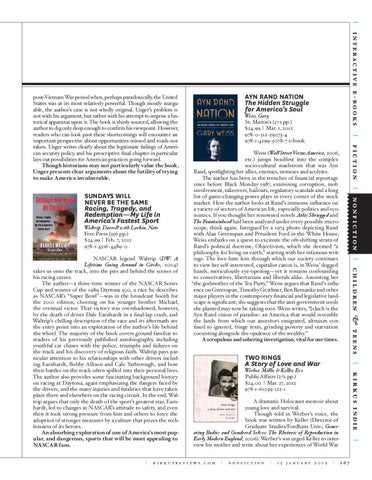post–Vietnam War period when, perhaps paradoxically, the United States was at its most relatively powerful. Though mostly inarguable, the author’s case is not wholly original. Unger’s problem is not with his argument, but rather with his attempt to impose a historical apparatus upon it. The book is thinly sourced, allowing the author to dig only deep enough to confirm his viewpoint. However, readers who can look past these shortcomings will encounter an important perspective about opportunities missed and roads not taken. Unger writes clearly about the legitimate failings of American security policy, and his prescriptive final chapter in particular lays out possibilities for American practices going forward. Though historians may not particularly value the book, Unger presents clear arguments about the futility of trying to make America invulnerable.
SUNDAYS WILL NEVER BE THE SAME Racing, Tragedy, and Redemption—My Life in America’s Fastest Sport
Waltrip, Darrell with Larkin, Nate Free Press (256 pp.) $24.99 | Feb. 7, 2012 978-1-4516-4489-0
NASCAR legend Waltrip (DW: A Lifetime Going Around in Circles, 2004) takes us onto the track, into the pits and behind the scenes of his racing career. The author—a three-time winner of the NASCAR Series Cup and winner of the 1989 Daytona 500, a race he describes as NASCAR’s “Super Bowl”—was in the broadcast booth for the 2001 edition, cheering on his younger brother Michael, the eventual victor. That victory was overshadowed, however, by the death of driver Dale Earnhardt in a final-lap crash, and Waltrip’s chilling description of the race and its aftermath are the entry point into an exploration of the author’s life behind the wheel. The majority of the book covers ground familiar to readers of his previously published autobiography, including youthful car chases with the police, triumphs and failures on the track and his discovery of religious faith. Waltrip pays particular attention to his relationships with other drivers including Earnhardt, Bobby Allison and Cale Yarborough, and how their battles on the track often spilled into their personal lives. The author also provides some fascinating background history on racing at Daytona, again emphasizing the dangers faced by the drivers, and the many injuries and fatalities that have taken place there and elsewhere on the racing circuit. In the end, Waltrip argues that only the death of the sport’s greatest star, Earnhardt, led to changes in NASCAR’s attitude to safety, and even then it took strong pressure from him and others to force the adoption of stronger measures by a culture that prizes the recklessness of its heroes. An absorbing exploration of one of America’s most popular, and dangerous, sports that will be most appealing to NASCAR fans. |
AYN RAND NATION The Hidden Struggle for America’s Soul
Weiss, Gary St. Martin’s (272 pp.) $24.99 | Mar. 1, 2012 978-0-312-59073-4 978-1-4299-5078-7 e-book
Weiss (Wall Street Versus America, 2006, etc.) jumps headfirst into the complex socio-cultural maelstrom that was Ayn Rand, spotlighting her allies, enemies, nemeses and acolytes. The author has been in the trenches of financial reportage since before Black Monday 1987, examining corruption, mob involvement, takeovers, bailouts, regulatory scandals and a long list of game-changing power plays in every corner of the stock market. Here the author looks at Rand’s immense influence on a variety of sectors of American life, especially politics and economics. If you thought her renowned novels Atlas Shrugged and The Fountainhead had been analyzed under every possible microscope, think again. Intrigued by a 1974 photo depicting Rand with Alan Greenspan and President Ford in the White House, Weiss embarks on a quest to excavate the oft-shifting strata of Rand’s political doctrine, Objectivism, which she deemed “a philosophy for living on earth,” starting with her infamous writings. The love-hate lens through which our society continues to view her self-interested, capitalist canon is, in Weiss’ dogged hands, meticulously eye-opening—yet it remains confounding to conservatives, libertarians and liberals alike. Anointing her “the godmother of the Tea Party,” Weiss argues that Rand’s influence on Greenspan, Timothy Geithner, Ben Bernanke and other major players in the contemporary financial and legislative landscape is significant; she suggests that the anti-government seeds she planted may now be taking root. Weiss writes, “[s]uch is the Ayn Rand vision of paradise: an America that would resemble the lands from which our ancestors emigrated, altruism confined to ignored, fringe texts, grinding poverty and starvation coexisting alongside the opulence of the wealthy.” A scrupulous and sobering investigation, vital for our times.
TWO RINGS A Story of Love and War
Werber, Millie & Keller, Eve PublicAffairs (272 pp.) $24.00 | Mar. 27, 2012 978-1-61039-122-1
A dramatic Holocaust memoir about young love and survival. Though told in Werber’s voice, the book was written by Keller (Director of Graduate Studies/Fordham Univ.; Generating Bodies and Gendered Selves: The Rhetoric of Reproduction in Early Modern England, 2006). Werber’s son urged Keller to interview his mother and write about her experiences of World War
kirkusreviews.com
|
nonfiction
|
15 january 2012
|
167
